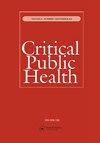“Digging in”: stigma and surveillance in the lives of pregnant and breastfeeding mothers who consume cannabis
IF 2.3
3区 医学
Q2 PUBLIC, ENVIRONMENTAL & OCCUPATIONAL HEALTH
引用次数: 0
Abstract
ABSTRACTSince the shift to legalizing recreational cannabis use in Canada in 2018, there has been increased attention on the consequences of cannabis use on women’s reproductive and maternal health, with particular attention to the impact of cannabis in utero and through breastfeeding. This has resulted in an intense focus on the behaviors of individuals who consume cannabis during the perinatal period, which raises questions about the impact this has on women and mothers who have historically been under the surveillance of the Canadian public health, health and social care, and legal systems. Grounded in an intersectional feminist framework that acknowledges how race, ability, class, and other social positions impact and differentiate women’s experience, this paper presents findings emerging from a participatory arts-based research approach called Photovoice with 23 mothers living throughout Canada. All participants consumed cannabis during pregnancy and breastfeeding and illustrated through photographs and individual and group discussion how their experiences of intersectional stigma and surveillance by health and social care providers resulted in barriers to accessing cannabis-related information and support. Implications arising from our inquiry suggest there is a dire need for public health, perinatal care, and social care responses that run counter to the current context where stigma and fear prevent parents from accessing cannabis information and support.KEYWORDS: Cannabispregnancybreastfeedingintersectional stigmasurveillance Disclosure statementNo potential conflict of interest was reported by the author(s).Notes1. Although we used the terms parents and chestfeeding in our proposal and recruitment process to be inclusive of all pregnant, infant feeding and parenting individuals, all participants who participated in the study identified themselves as Mothers who breastfeed.2. The TRC issues 94 calls to action call on all levels of the Canadian government to work together to repair the harm caused by residential schools and begin the process of reconciliation.Additional informationFundingThis study was funded by the Social Science & Humanities Research Council (Grant number 435-2019-0215) and an RFP from the Canadian Centre on Substance Use and Addiction (Cannabis Closing the Gaps RFP).“深挖”:吸食大麻的孕妇和哺乳期母亲生活中的耻辱和监视
摘要自2018年加拿大将娱乐性大麻使用合法化以来,人们越来越关注大麻使用对妇女生殖和孕产妇健康的影响,特别是大麻对子宫内和母乳喂养的影响。这导致人们强烈关注围产期吸食大麻个人的行为,这就提出了这对历来受到加拿大公共卫生、卫生和社会保健以及法律制度监督的妇女和母亲的影响的问题。基于一个交叉的女权主义框架,承认种族、能力、阶级和其他社会地位如何影响和区分女性的经历,本文介绍了一项名为“Photovoice”的参与式艺术研究方法的发现,该研究方法基于生活在加拿大各地的23位母亲。所有参与者都在怀孕和哺乳期间吸食大麻,并通过照片和个人和小组讨论说明了她们受到卫生和社会保健提供者的交叉羞辱和监视的经历如何导致她们难以获得与大麻有关的信息和支持。我们的调查产生的影响表明,迫切需要公共卫生、围产期护理和社会护理对策,这些对策与目前的情况背道而驰,目前的情况是,耻辱和恐惧使父母无法获得大麻信息和支持。关键词:大麻;妊娠;母乳喂养;交叉污名;尽管我们在提案和招募过程中使用了“父母和母乳喂养”这一术语,以涵盖所有孕妇、婴儿喂养者和养育者,但所有参与研究的参与者都认为自己是母乳喂养的母亲。TRC发布了94项行动呼吁,呼吁加拿大各级政府共同努力修复寄宿学校造成的伤害,并开始和解进程。本研究由社会科学与人文研究委员会(资助号435-2019-0215)和加拿大物质使用和成瘾中心的RFP(大麻缩小差距RFP)资助。
本文章由计算机程序翻译,如有差异,请以英文原文为准。
求助全文
约1分钟内获得全文
求助全文
来源期刊

Critical Public Health
Multiple-
CiteScore
5.90
自引率
7.10%
发文量
36
期刊介绍:
Critical Public Health (CPH) is a respected peer-review journal for researchers and practitioners working in public health, health promotion and related fields. It brings together international scholarship to provide critical analyses of theory and practice, reviews of literature and explorations of new ways of working. The journal publishes high quality work that is open and critical in perspective and which reports on current research and debates in the field. CPH encourages an interdisciplinary focus and features innovative analyses. It is committed to exploring and debating issues of equity and social justice; in particular, issues of sexism, racism and other forms of oppression.
 求助内容:
求助内容: 应助结果提醒方式:
应助结果提醒方式:


